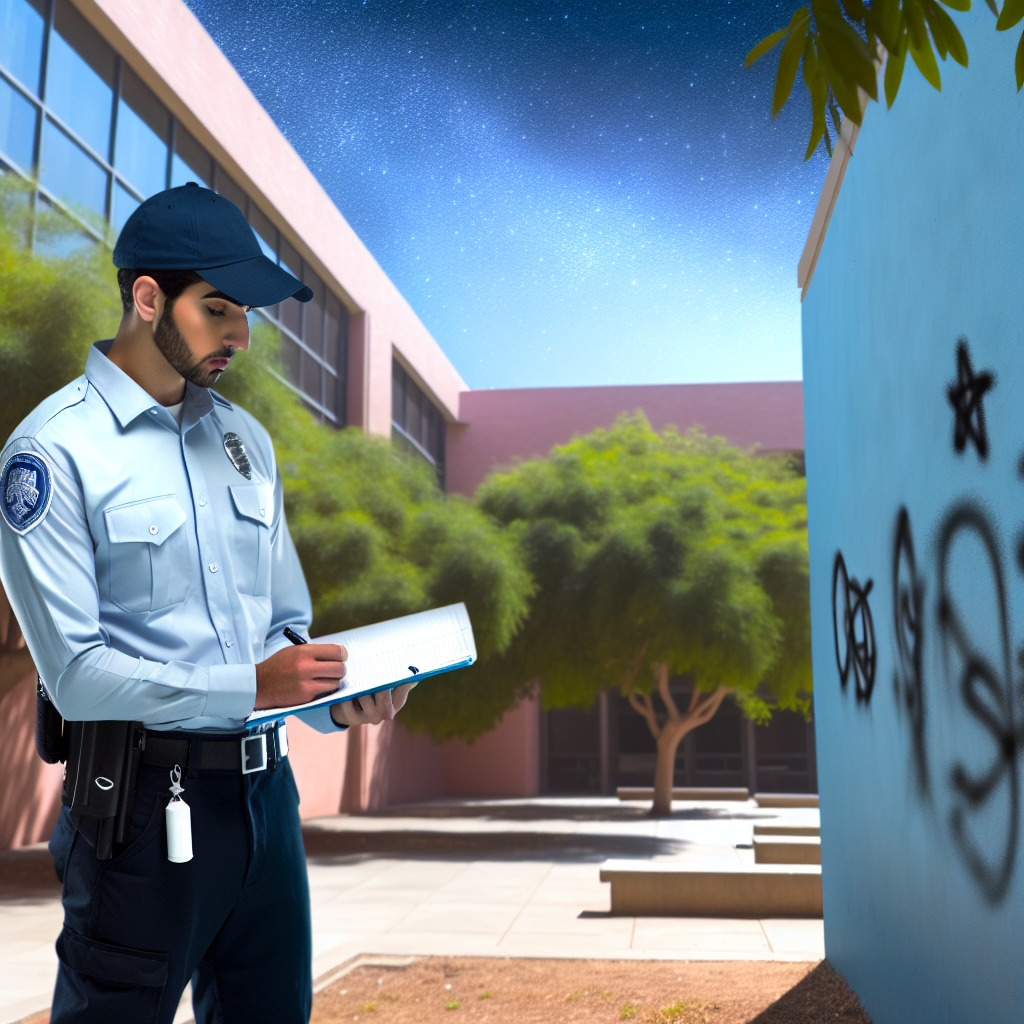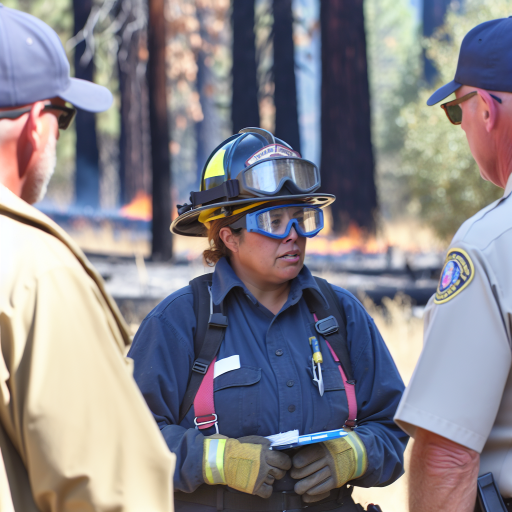As a campus security officer, it is my duty to ensure the safety and security of the college campus.
Vandalism is a prevalent issue on college campuses, ranging from graffiti to property damage.
Addressing vandalism is crucial for maintaining campus safety and promoting student well-being.
Responsibilities of a Campus Security Officer
As a campus security officer, there are numerous responsibilities that one must undertake to ensure the safety and security of the school grounds.
- Daily tasks and duties of a campus security officer
- Importance of proactive patrols and monitoring for preventing vandalism
- Collaborating with campus administrators and law enforcement agencies
One of the primary responsibilities of a campus security officer is to conduct regular patrols of the campus to monitor for any suspicious activity.
They also respond to any security incidents that occur on campus, such as fights, thefts, or disturbances among students.
In addition, campus security officers may be responsible for monitoring surveillance cameras, checking in visitors, and enforcing campus policies.
Proactive patrols and monitoring are crucial in preventing vandalism on campus.
By regularly patrolling the grounds and keeping a watchful eye out for any signs of vandalism, security officers can deter potential vandals from committing acts of destruction.
Furthermore, proactive patrols allow security officers to identify vulnerable areas on campus that may be more susceptible to vandalism and take measures to address them before any damage occurs.
Collaboration with campus administrators and law enforcement agencies is essential for campus security officers to effectively address vandalism issues.
By working together, security officers can gather valuable information and intelligence on potential vandals or hotspots for vandalism.
Additionally, collaborating with law enforcement agencies allows security officers to escalate incidents of vandalism to the appropriate authorities and take swift action to apprehend perpetrators.
Understanding the Impact of Vandalism
Vandalism can have far-reaching consequences beyond physical damage.
It affects the entire campus community, including students, faculty, staff, and visitors.
Effects of Vandalism on Campus Facilities and Infrastructure
- Damage to buildings, walls, furniture, and equipment.
- Graffiti and defacement of property.
- Disruption of normal operations and services.
Cost Implications for the College or University
- Financial resources diverted to repair and replace vandalized property.
- Increase in insurance premiums.
- Decrease in funding for academic programs and student services.
Impact on Student Morale and Sense of Safety
- Feeling of insecurity and fear of further vandalism.
- Effect on the overall atmosphere of the campus.
- Potential decline in enrollment and retention rates due to safety concerns.
It is essential for campus security officers to address these issues promptly and effectively.
They must ensure the safety and well-being of everyone on campus.
Learn More: Navigating Wildland Firefighter Career Changes
Recognizing Common Vandalism Patterns
When it comes to campus security, one of the key aspects that security officers need to focus on is recognizing common vandalism patterns.
By understanding the patterns, security officers can be better equipped to address and prevent vandalism on campus.
Transform Your Career Today
Unlock a personalized career strategy that drives real results. Get tailored advice and a roadmap designed just for you.
Start NowIdentifying high-risk areas on campus
One of the first steps in addressing vandalism issues is identifying high-risk areas on campus.
These areas typically include places with limited visibility, such as secluded corners, stairwells, and parking lots.
Vandalism is more likely to occur in these areas as they provide cover for individuals to engage in destructive behavior without being easily seen.
Common high-risk areas on campus also include bathrooms, locker rooms, and common areas where students gather.
These places are often targeted by vandals due to the higher likelihood of not being caught in the act.
By identifying and increasing security measures in these areas, campus security officers can deter vandals and minimize the risk of vandalism occurring.
Understanding motivations behind vandalism
In order to effectively address and prevent vandalism on campus, it is crucial for security officers to understand the motivations behind such behavior.
Vandalism can be driven by a variety of factors, including boredom, peer pressure, anger, and even a desire for attention or recognition.
By understanding these motivations, security officers can tailor their prevention strategies to address the underlying causes of vandalism.
For example, implementing engaging activities and programs for students can help alleviate boredom and provide constructive outlets for their energy.
Fostering a sense of community and belonging on campus can also reduce the likelihood of vandalism driven by feelings of alienation or peer pressure.
Strategies for predicting and preventing future incidents
Once high-risk areas and motivations behind vandalism have been identified, campus security officers can implement strategies for predicting and preventing future incidents.
- Increasing patrols and surveillance in high-risk areas
- Installing security cameras and alarm systems in vulnerable locations
- Implementing access control measures to restrict entry to certain areas
- Engaging with students and staff to raise awareness about the negative impacts of vandalism
- Establishing partnerships with local law enforcement agencies to address vandalism issues collaboratively
By proactively implementing these strategies, campus security officers can create a safer and more secure environment for students, staff, and visitors.
Preventing vandalism not only protects the physical infrastructure of the campus but also fosters a sense of community pride and respect for the shared spaces on campus.
Explore Further: How TSA Officers Ensure Compliance with Security Regulations
Implementing Security Measures
Implementing security measures is essential in addressing vandalism issues on campus.
By taking proactive steps to enhance security, campus security officers can effectively deter vandals and protect campus property.
One of the key measures that can be implemented is the installation of security cameras and alarms in vulnerable areas around the campus.
These cameras can help monitor suspicious activities and provide valuable evidence in case of vandalism incidents.
Showcase Your Business Today
Reach thousands of readers actively exploring professional services. Publish your business profile and grow your audience now.
Publish NowIn addition to cameras and alarms, increasing lighting and visibility in certain areas can also discourage vandals from committing acts of vandalism.
Well-lit areas are less likely to be targeted by vandals, as they prefer to operate in darkness where they are less likely to be seen.
Another important security measure is the establishment of reporting mechanisms for students, faculty, and staff to report any suspicious activities they may witness.
This can include a hotline, online form, or even a dedicated email address for reporting incidents anonymously.
By implementing these security measures, campus security officers can create a safer and more secure environment for everyone on campus.
It is important to regularly review and update these measures to stay ahead of potential threats and ensure effective protection against vandalism.
- Installing security cameras and alarms in vulnerable areas.
- Increasing lighting and visibility to deter vandals.
- Establishing reporting mechanisms for suspicious activities.
You Might Also Like: Top Forensic Science Cases in History
Collaborating with Students and Staff
Engaging with the campus community to raise awareness about vandalism.
Encouraging students and staff to report incidents promptly.
Implementing educational programs to promote respect for campus property.
Engaging with the Campus Community: As a campus security officer, it is crucial to build a positive rapport with students and staff. By actively engaging with the campus community, you can raise awareness about the negative impact of vandalism. This can be done through informational sessions, workshops, and campaigns that highlight the consequences of vandalism on campus property.
Encouraging Reporting of Incidents: One of the most effective ways to address vandalism issues is to encourage students and staff to report any incidents promptly. By creating a safe and confidential reporting system, individuals are more likely to come forward with information that can help identify the perpetrators. This not only aids in investigating past incidents but also serves as a deterrent for future acts of vandalism.
Implementing Educational Programs: Another proactive approach is to implement educational programs that promote respect for campus property. These programs can focus on teaching students and staff about the value of maintaining a safe and clean campus environment. By instilling a sense of pride and responsibility in the community, individuals are more likely to take ownership of the campus and look out for any suspicious behavior that may lead to vandalism.
Collaborating with students and staff is essential in addressing vandalism issues on campus. By raising awareness, encouraging reporting, and promoting respect for campus property, campus security officers can work together with the community to create a safe and welcoming environment for everyone.
Uncover the Details: Ethics and Integrity in the Secret Service Profession

When it comes to addressing vandalism issues on campus, one of the key aspects that Campus Security Officers need to focus on is responding to vandalism incidents effectively.
This involves developing protocols for documenting and investigating vandalism, coordinating with law enforcement for criminal investigations, and implementing disciplinary measures for offenders.
Developing Protocols for Documenting and Investigating Vandalism
- Start by creating a standardized form for reporting vandalism incidents.
- Include details such as the date, time, location, and extent of damage.
- Assign designated officers to investigate each vandalism report thoroughly.
- Collect evidence such as photographs, witness statements, and any other relevant information.
- Ensure that all information is documented accurately and stored securely.
Coordinating with Law Enforcement for Criminal Investigations
- Establish a strong partnership with local law enforcement agencies.
- Share all pertinent information and evidence collected during the investigation.
- Collaborate on identifying suspects and gathering additional evidence if needed.
- Work together to apprehend and prosecute individuals responsible for vandalism.
- Keep lines of communication open throughout the investigation process.
Implementing Disciplinary Measures for Offenders
- Enforce a zero-tolerance policy for vandalism on campus.
- Hold offenders accountable for their actions through appropriate disciplinary action.
- Consider imposing fines, community service, or other penalties as deterrents.
- Educate the campus community about the consequences of vandalism.
- Provide opportunities for offenders to learn from their mistakes and make amends.
By following these steps and working closely with law enforcement, Campus Security Officers can effectively respond to vandalism incidents.
They can document and investigate them thoroughly, and implement disciplinary measures to prevent future incidents from occurring.
Evaluating the Effectiveness of Security Measures
Monitoring vandalism trends and incident rates over time.
Seeking feedback from campus stakeholders on security improvements.
Adjusting security protocols based on feedback and data analysis.
One crucial aspect of addressing vandalism issues on campus is evaluating the effectiveness of security measures in place.
By monitoring vandalism trends and incident rates over time, campus security officers can identify patterns and areas of vulnerability.
Regularly tracking vandalism incidents allows security personnel to assess the impact of their current strategies and make necessary adjustments to prevent future occurrences.
This proactive approach enables officers to stay ahead of potential threats and maintain a safe environment for students, faculty, and staff.
Seeking feedback from campus stakeholders is another valuable method for evaluating security measures.
By engaging with members of the community, security officers can gain insights into their concerns, suggestions for improvement, and overall satisfaction with the level of security provided.
Listening to the feedback from students, faculty, and staff helps security personnel understand the specific needs and priorities of the campus community.
This information can inform decision-making processes and guide the implementation of targeted security enhancements that address the unique challenges faced by the institution.
Furthermore, analyzing the data collected from monitoring vandalism trends and feedback from stakeholders is essential for evaluating the effectiveness of security measures.
By examining patterns, identifying trends, and correlating incidents with specific locations or times, security officers can pinpoint areas that require additional attention and resources.
Based on this analysis, security protocols can be adjusted to strengthen weak points, enhance deterrence measures, and improve response strategies.
This data-driven approach ensures that security measures are continuously optimized to effectively address vandalism issues and maintain a secure campus environment.
Evaluating the effectiveness of security measures is a critical component of addressing vandalism issues on campus.
By monitoring trends, seeking feedback, and analyzing data, security officers can enhance their strategies, prioritize resources, and proactively prevent vandalism incidents.
This proactive and data-driven approach is essential for maintaining a safe and secure campus for all members of the community.
Importance of Addressing Vandalism on Campus
Addressing vandalism on college campuses is crucial.
This effort maintains a safe and secure environment for students and staff.
Campus security officers play a vital role in preventing vandalism.
Showcase Your Business Today
Reach thousands of readers actively exploring professional services. Publish your business profile and grow your audience now.
Publish NowTheir vigilance and proactive measures are essential.
Students, staff, and security personnel must actively collaborate.
Working together effectively prevents vandalism on campus.
Additional Resources
EDUCATION CODE CHAPTER 37. DISCIPLINE; LAW AND ORDER
Benefits Of School Protection Services | CPH Security Group
[E-Books for Sale]
The Big Book of 500 High-Paying Jobs in America: Unlock Your Earning Potential
$19.99 • 500 High-Paying Jobs • 330 pages
Explore 500 high-paying jobs in America and learn how to boost your career, earn more, and achieve success!
See All 500 High-Paying Jobs of this E-Book
1001 Professions Without a Degree: High-Paying American Jobs You Can Start Now
$19.99 • 1001 Professions Without a Degree • 174 pages
Discover 1001 high-paying jobs without a degree! Unlock career tips, skills, and success strategies for just $19.99!




